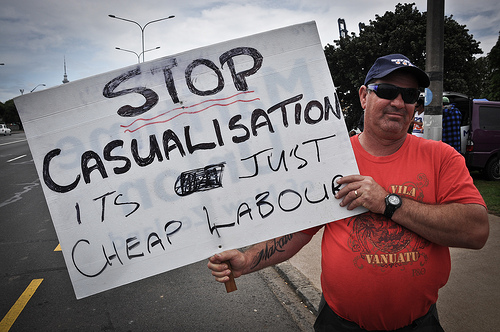 This article is part three in a series of articles by Polly Peek. The first two parts can be read in the January and February issues of The Spark or online here (part 1) and here (part 2)
This article is part three in a series of articles by Polly Peek. The first two parts can be read in the January and February issues of The Spark or online here (part 1) and here (part 2)
The low employment rates for people experiencing mental ill health can be attributed to a combination of individual discrimination and, more predominantly, systemic barriers. Research into occupational perspectives on recovery by Mary Kelly, Scott Lamont and Scott Brunero, highlighted the experiences of a mental health consumer who was forced to take early retirement by his employers upon disclosure that he was seeing a psychiatrist. This kind of anecdotal evidence may give perspective to the question of whether mental ill health leads to unemployment, or loss of employment erodes resiliency with the suggestion that where illness leads to unemployment, it may, in many cases not result exclusively from symptom recovery but external issues such as inter-personal discrimination.
 I would argue that in these situations individual discrimination is a result of a wider systemic issue that is the bottom-line focus of businesses. This priority is evident in research such as that produced by London School of Economics and Political Science researchers which outlines the 10 billion pound annual loss to businesses as a result of “failure of employees to fulfil their contractual hours” while absent from work sick. Extending on this, the authors cite the increasing presence of mental illness in the global burden of disease as a reason for some people being absent from work up to three times as often as their colleagues. While similar finding have featured in New Zealand research such as that undertaken by Southern Cross, and cited in the NZ Herald in 2009, more attention to the abilities of employers to reduce the impact of mental illness on workplace performance could improve employment opportunities for people with mental illness in the absence of a larger societal change away from prioritising profit.
I would argue that in these situations individual discrimination is a result of a wider systemic issue that is the bottom-line focus of businesses. This priority is evident in research such as that produced by London School of Economics and Political Science researchers which outlines the 10 billion pound annual loss to businesses as a result of “failure of employees to fulfil their contractual hours” while absent from work sick. Extending on this, the authors cite the increasing presence of mental illness in the global burden of disease as a reason for some people being absent from work up to three times as often as their colleagues. While similar finding have featured in New Zealand research such as that undertaken by Southern Cross, and cited in the NZ Herald in 2009, more attention to the abilities of employers to reduce the impact of mental illness on workplace performance could improve employment opportunities for people with mental illness in the absence of a larger societal change away from prioritising profit.
Of course, in an economic system based on competition, it could be considered unrealisitic to rely on employers’ compassionate interest in mental health to significantly improve empolyment and health outcomes for tangata whai ora. The potential benefits of assistance and awareness campaigns centred on this approach are limited and a focus on broader changes to the way we organise work is needed.

Another major systemic barrier to attaining work in New Zealand is the employment situation, driven by low wages that sees a considerable segment of society working greater than full-time hours. When full-time work is taken to mean thirty hours per week, 34.79% of full-time workers in New Zealand are considered to work ‘long hours’ of fifty or more hours a week according to the Department of Labour and Statistics NZ. While this significant percentage of workers spend long hours at work, the unemployment rate for New Zealand currently sits at 6.5%. So this illustrates, in New Zealand, the way that work hours are trending towards being polarised with a considerable segment of the working population being over-employed, and a significant number of working-aged people being unemployed. Reflecting on a similar situation in the US, American researchers have discussed the common issue of mismatches between workers’ actual and preferred hours of work and the reduction in well-being that results from this incompatibility.
Aside from the systemic barriers to achieving work which is beneficial to recovery and well-being, research suggests that not all jobs will have this positive impact for people with on-going mental ill health. Annie Southern summarises, “affiliation and integration with one’s society can stem from a positive career experience whereas alienation from society can occur if negative experiences occur” while the International Labour Organisation asserts that “access to decent work is an antidote to social exclusion right across our global economy”. Defining the components that make a career experience positive is difficult, however the International Labour Organisation has established the characteristics of decent work, identifying five key points:
There should be sufficient work for all to have full access to income-earning opportunities; it generates an adequate income; workers’ rights are protected in it; it is productive, not just existing as ‘work for work’s sake’; it provides adequate social protection.
(ILO, 1999, cited in Tipple, 2006)

Earlier this year, an Australian longitudinal study carried out by Butterworth and others, found that jobs which scored amongst the lowest in terms of psycho-social quality caused greater decline of mental well-being in workers who became employed than those who remained without work. This finding stood out against the trend of employment in higher psycho-social scoring jobs being related consistently with improved mental health. The study defined psycho-social quality in terms of levels of control, demands and complexity, job security and fairness of pay. These findings are supported by other studies such as that of Lewchuk, Clarke and de Wolff, which found “employment relationships where future employment is uncertain, where individuals are actively searching for new employment and where support is limited are associated with poorer health indicators”.
The research on psycho-social quality of jobs and impact on well-being holds much relevance for the New Zealand mental health consumer population. Research has shown that people with experience of mental illness disproportionately tend to gain employment in low-paid jobs, and that the likelihood of this employment outcome can serve as a disincentive to seek work when unemployed. The evidence that many mental health consumers in New Zealand who access employment work in low paid jobs with few hours, remains true for people who access supported employment services, potentially explaining the reluctance of the mental health system to utilise organisations providing these services. In the current New Zealand labour situation it could also be argued that job security has recently decreased for people with experience of mental illness as well as the wider population as the ninety day trial employment period has been taken up by many employers. This, in combination with low levels of pay could reduce psycho-social job quality to a point where employment has detrimental impacts on consumers’ recovery and wellbeing.
Continue to part 4

Good food for thought, time for a ponder.